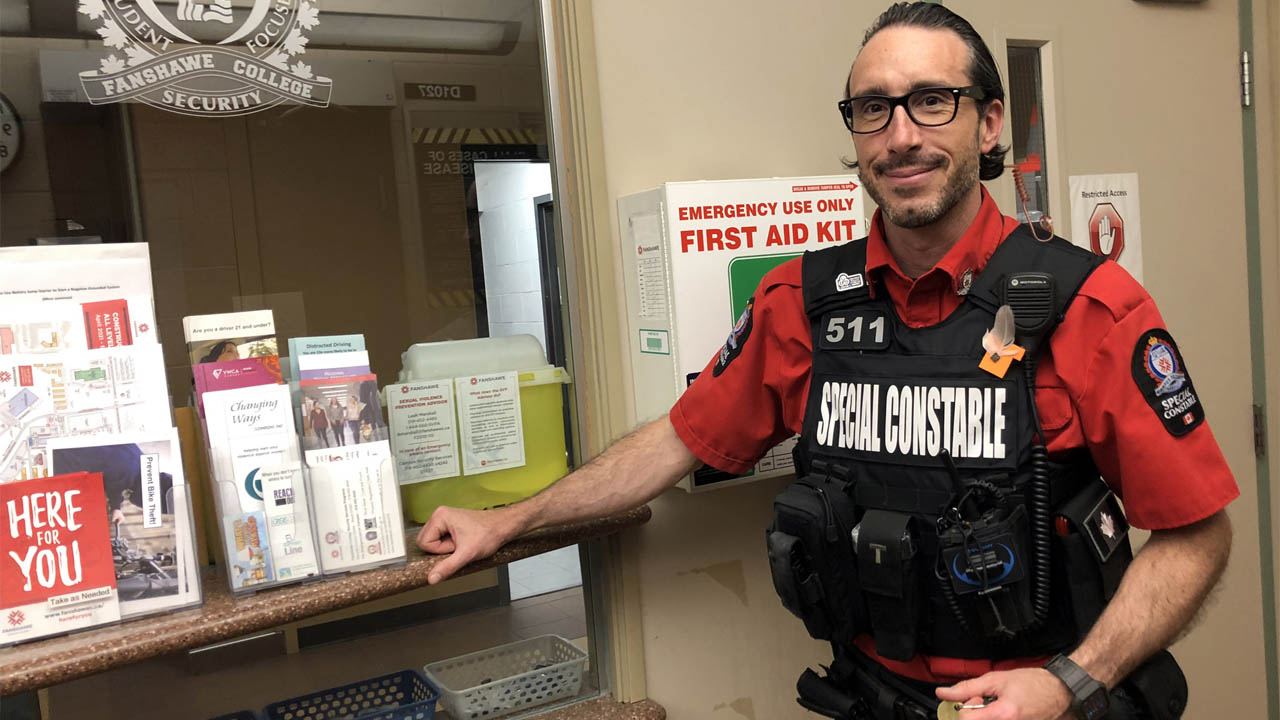Fanshawe security taking steps to help on-campus mental health crises
 CREDIT: GERARD CRECES
CREDIT: GERARD CRECESSpecial Constable Mike Lukic with Fanshawe College Security said education and openness to talk about mental health are key to helping students in distress get the help they need.
Mental health crises can hit anywhere and any time. For students, facing the stresses of juggling homework, class schedules and being away from home for the first time can all contribute to poor mental health. However, should they experience a crisis while at school, calling Fanshawe College Security could make a world of difference at a time when every second counts.
Mike Lukic is a special constable with Fanshawe College Security and a facilitator on the school’s mental health first aid team.
This is Lukic’s 12th September working at Fanshawe College. As such, he’s responded to several calls over the years throughout campus and residences. He said the number of calls security receives for mental health crises has increased substantially over the past decade.
Part of that may be due to the de-stigmatization of mental health in general over the past several years. Another large factor, Lukic said, could be social media. People talk now, and can reach out anywhere, any time as opposed to a decade ago.
“In 2011, mental health was there, but it wasn’t necessarily talked about like it is now,” he said. “It’s more acceptable to a certain degree to be more open about mental health.”
Still, the increase in mental health-related calls to Fanshawe College Security means more students are seeking help when in distress. Thankfully, the security team has a number of ways to help.
In extreme instances where someone is experiencing a mental health crisis, security can take them into custody and bring them to a hospital for proper care. It is not the same as arresting someone, Lukic explained. Rather, it’s getting the person in crisis out of harm’s way and into a place that can treat them.
Something that exists at Fanshawe that few people experiencing a mental health crisis receive in the general public is follow-up care.
Fanshawe has a dedicated counsellor to help students in crisis return to school, refer them to services that are available, and do what they can to ensure the student succeeds.
“We’re here to focus on student success,” said Lukic. “We have a vested interest to see those students do well. If they’re in crisis, we want to help. We want to help them get back here so they can study and succeed and get out there and represent Fanshawe.”
Early intervention is key to avoiding a mental health crisis. As part of the mental health first aid team, Lukic’s role is to educate others at the college to spot and assist students who may be in need.
The goal of the mental health first aid team isn’t to diagnose and treat, he said, it’s to ensure that staff can recognize students in distress and intervene early to see if they need help.
“It’s not about identifying disorders,” he said. “It’s about seeing somebody that may need some help and utilize the skills you learn and the knowledge you have about the services we have and direct them to that.
“The more people we have and the more courses we have, the better the college is because of it.”
The residence team is another crucial piece of the mental health response team. They have their own team and internal services for students in distress, but together with security and counselling, the safety net for students in crisis is wide and willing to help.
“You’re in a good place if you’re at Fanshawe,” he said.

















